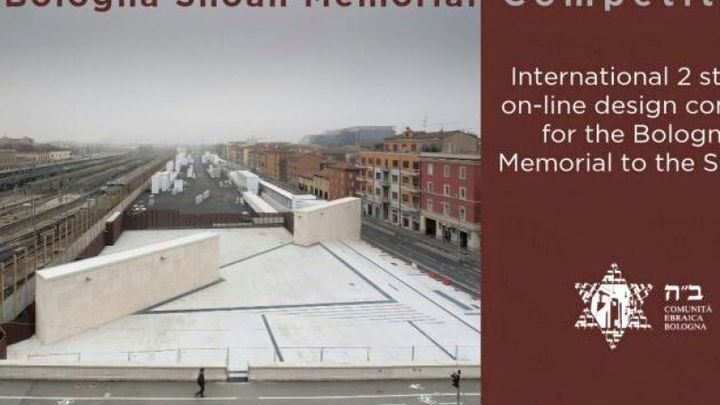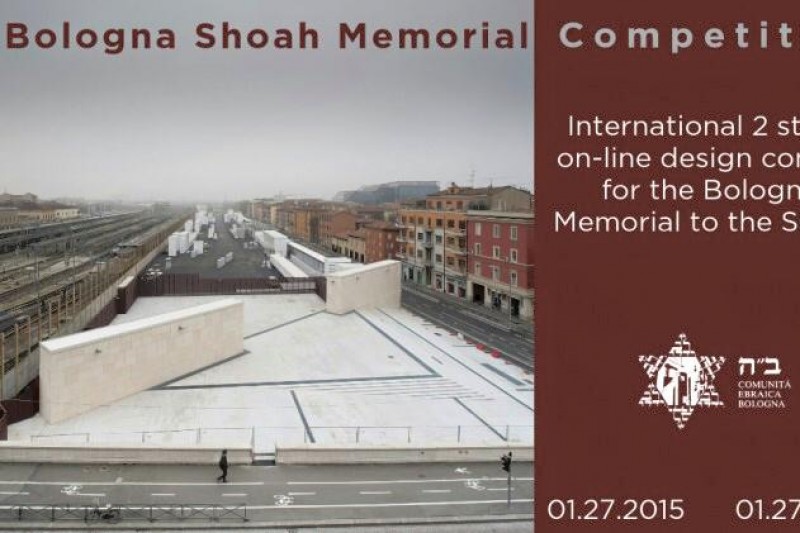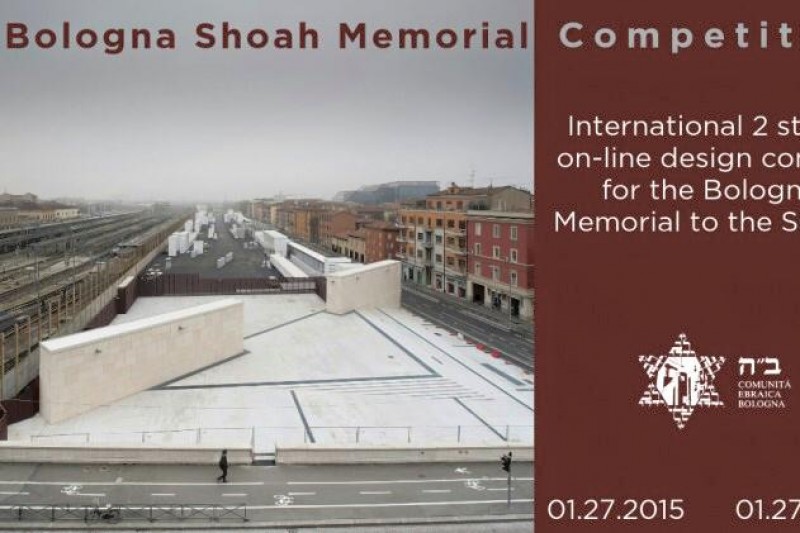
Bologna Holocaust Memorial
Donation protected
BOLOGNA SHOAH MEMORIAL DESIGN COMPETITION

To celebrate “Memorial Day” (established in Italy on 20 July 2000 with Law no. 211) in 2015, the seventieth anniversary of the liberation of Auschwitz concentration camp, Bologna’s Jewish Community and the Union of Italian Jewish Communities (Unione delle Comunità Ebraiche) are sponsoring the creation of a "Shoah Memorial” to be located on a significant site in the city. This competition announcement invites artists and designers from all over the world to take part.
The objective is to create a place to keep the memory of the Shoah alive.
Historian Yosef Hayim Yerushalmi emphasises how the Jews were the first to give meaning to history by resolving to “acknowledge it”; keeping this memory alive is, therefore, a key component in the Jewish concept of life and means they will never lose their identity. In the Memorial project this principle will refer to the wider identity of the human condition. In actual fact more than 3 million Jews met with their deaths in concentration camps (which with shootings and deaths in the ghettos reached around 6 million), as did 3,300,000 soviet prisoners of war (the policy of annihilation befell the Slavs too), 1 million political opponents, 500,000 Roma gypsies (Porajamos = destruction in the Romanès language), around 9,000 homosexuals and 2,250 Jehovah’s Witnesses, in addition to 270,000 deaths amongst the disabled and mentally ill.
This sad page in European and World history must help us build a future for our children that can link to the past and the present, where diversity is fully appreciated. If we wish to fight racism, we must learn to put ourselves in the place of others, to believe that what happens to our neighbour could also happen to us. Bearing this in mind, we are called upon to build new cultural policies, both in Italy and the rest of Europe.
The Memorial interprets this objective, expressing it as a spatial structure that can engage our citizens, inviting them to enter a different dimension, in a journey that moves from the historic drama of this extermination to the contemplation of beauty in the urban landscape: from violence and death to life. Those who cross this space will participate in a personal and intimate experience, which, linked to the concept of memory, will raise questions, yet the site will offer no preconceived answers. So the Memorial does not aim to provide the visitor with information on the historical facts it refers to, nor does it aim to tell or explain the story of the Shoah or what was happening in Bologna at the time. Archives, libraries, research centres and documentation will do that, both in the city and online. The idea shared by the sponsors of the competition and the Council of Bologna is to house the Memorial in the new square created at the crossroads between Via Carracci and the bridge of Via Matteotti. A square that came about “by accident” (a fragment of an unfinished railway station), but situated in a heavily trafficked area, where the oldest part of Bologna meets the urban expansion of the early 1900s; a square that will be visited by a wide and varied array of citizens and whose main feature will be that of Remembrance.
Precisely because of the square’s nature as a place of transit and relations, the project must tackle the issues of the use and duration of the Memorial, the issues linked to its protection and maintenance over time.
Bologna’s Shoah Memorial should “stop the passerby” in a space that we must imagine as monumental in its entire length and breadth. An evocative place, where History, recalled to Memory, becomes a message to Mankind. In an era when the direct witnesses of the time are disappearing, it is the job of society to treasure the memory: life goes on and our children will guarantee that memory.
MEMORIALE DELLA SHOAH DI BOLOGNA
CONCORSO INTERNAZIONALE DI PROGETTAZIONE PROCEDURA APERTA IN DUE FASI
Giorno della Memoria | un memoriale per non dimenticare
Bologna testimone del tempo
In occasione del “Giorno della Memoria” (istituito in Italia con Legge 20 luglio 2000 n. 211) nell'anno 2015, settantesimo anniversario della liberazione del campo di concentramento di Auschwitz, la Comunità Ebraica di Bologna e l'Unione delle Comunità Ebraiche in Italia, promuovono la realizzazione di un "Memoriale della Shoah" da ubicarsi in un luogo rilevante della città, invitando, con il presente bando di concorso, artisti e progettisti di tutto il mondo a confrontarsi sul tema.
L'obiettivo che si intende perseguire è quello di costruire un luogo che possa mantenere viva la memoria della Shoah.
Lo storico Yosef Hayim Yerushalmi sottolinea come gli ebrei siano stati i primi a dare un senso alla storia per il loro proposito di “riconoscerla”; fare vivere la memoria, quindi, componente essenziale del concetto ebraico della vita, significa non perdere la propria identità. Nel progetto del Memoriale questo principio si riferirà alla più ampia identità della condizione umana. Nei campi infatti trovarono la morte oltre 6 milioni di ebrei, 3.300.000 prigionieri di guerra sovietici (anche sugli slavi piombò la politica di annientamento), 1 milione di oppositori politici, 500.000 zingari Rom (Porajamos = distruzione nel linguaggio Romanès), circa 9.000 omosessuali, 2.250 testimoni di Geova oltre a 270.000 morti tra disabili fisci e psichici.
Questa triste pagina della storia europea e mondiale deve aiutarci a costruire per i nostri figli un futuro che sappia ricollegarsi al passato e al presente, in cui sia valorizzata la diversità. Se vogliamo combattere il razzismo, dobbiamo imparare a metterci nei panni dell’altro, pensare che ciò che capita al nostro vicino potrebbe succedere anche a noi. Con questi presupposti siamo chiamati a costruire nuove politiche culturali, in Italia e in Europa.
Il Memoriale interpreterà questo obiettivo, traducendolo in una struttura spaziale in grado di coinvolgere la cittadinanza, invitandola ad entrare in una diversa dimensione, in un percorso che vada dal dramma storico dello sterminio alla contemplazione della bellezza nel paesaggio urbano: dalla violenza e dalla morte alla vita. Chi attraverserà questo spazio proverà una personale ed intima esperienza, che, collegata al concetto di memoria, procurerà domande, senza che il luogo offra risposte predeterminate. Il Memoriale quindi non ha l'obiettivo di informare il visitatore sui fatti storici cui si riferisce, né quello di raccontare o narrare la storia della Shoah o quello che allora accadde a Bologna. Archivi, biblioteche, centri di studio e documentazione operano in questo senso, in città e in rete. L’idea condivisa dai promotori del concorso con il Comune di Bologna è quella di ospitare il memoriale nella nuova piazza realizzata nel crocevia tra via Carracci ed il ponte di via Matteotti. Una piazza nata da un “accidente” (frammento di una incompiuta stazione ferroviaria), ma localizzata in posizione di grande transito, nella connessione tra il centro antico di Bologna e la espansione urbana di inizio '900, piazza che sarà frequentata da una vasta e molteplice cittadinanza e la cui connotazione primaria sarà proprio quella della Memoria.
Proprio in virtù della natura di luogo di transito e di relazione della piazza, il progetto dovrà affrontare il tema della utilizzazione e della durata del Memoriale, le questioni legate alla sua protezione e manutenibilità nel tempo.
Il Memoriale della Shoah di Bologna dovrà riuscire a “fermare il passante” in uno spazio che dobbiamo immaginare monumentale in tutta la sua ampiezza ed estensione. Un luogo suggestivo, in cui la Storia, richiamata alla Memoria, diventi un messaggio rivolto a tutta l’Umanità. Nel tempo in cui i testimoni diretti del tempo scompaiono è compito della società custodire la memoria: la vita continua e i nostri figli saranno la garanzia del ricordo.

To celebrate “Memorial Day” (established in Italy on 20 July 2000 with Law no. 211) in 2015, the seventieth anniversary of the liberation of Auschwitz concentration camp, Bologna’s Jewish Community and the Union of Italian Jewish Communities (Unione delle Comunità Ebraiche) are sponsoring the creation of a "Shoah Memorial” to be located on a significant site in the city. This competition announcement invites artists and designers from all over the world to take part.
The objective is to create a place to keep the memory of the Shoah alive.
Historian Yosef Hayim Yerushalmi emphasises how the Jews were the first to give meaning to history by resolving to “acknowledge it”; keeping this memory alive is, therefore, a key component in the Jewish concept of life and means they will never lose their identity. In the Memorial project this principle will refer to the wider identity of the human condition. In actual fact more than 3 million Jews met with their deaths in concentration camps (which with shootings and deaths in the ghettos reached around 6 million), as did 3,300,000 soviet prisoners of war (the policy of annihilation befell the Slavs too), 1 million political opponents, 500,000 Roma gypsies (Porajamos = destruction in the Romanès language), around 9,000 homosexuals and 2,250 Jehovah’s Witnesses, in addition to 270,000 deaths amongst the disabled and mentally ill.
This sad page in European and World history must help us build a future for our children that can link to the past and the present, where diversity is fully appreciated. If we wish to fight racism, we must learn to put ourselves in the place of others, to believe that what happens to our neighbour could also happen to us. Bearing this in mind, we are called upon to build new cultural policies, both in Italy and the rest of Europe.
The Memorial interprets this objective, expressing it as a spatial structure that can engage our citizens, inviting them to enter a different dimension, in a journey that moves from the historic drama of this extermination to the contemplation of beauty in the urban landscape: from violence and death to life. Those who cross this space will participate in a personal and intimate experience, which, linked to the concept of memory, will raise questions, yet the site will offer no preconceived answers. So the Memorial does not aim to provide the visitor with information on the historical facts it refers to, nor does it aim to tell or explain the story of the Shoah or what was happening in Bologna at the time. Archives, libraries, research centres and documentation will do that, both in the city and online. The idea shared by the sponsors of the competition and the Council of Bologna is to house the Memorial in the new square created at the crossroads between Via Carracci and the bridge of Via Matteotti. A square that came about “by accident” (a fragment of an unfinished railway station), but situated in a heavily trafficked area, where the oldest part of Bologna meets the urban expansion of the early 1900s; a square that will be visited by a wide and varied array of citizens and whose main feature will be that of Remembrance.
Precisely because of the square’s nature as a place of transit and relations, the project must tackle the issues of the use and duration of the Memorial, the issues linked to its protection and maintenance over time.
Bologna’s Shoah Memorial should “stop the passerby” in a space that we must imagine as monumental in its entire length and breadth. An evocative place, where History, recalled to Memory, becomes a message to Mankind. In an era when the direct witnesses of the time are disappearing, it is the job of society to treasure the memory: life goes on and our children will guarantee that memory.
MEMORIALE DELLA SHOAH DI BOLOGNA
CONCORSO INTERNAZIONALE DI PROGETTAZIONE PROCEDURA APERTA IN DUE FASI

Giorno della Memoria | un memoriale per non dimenticare
Bologna testimone del tempo
In occasione del “Giorno della Memoria” (istituito in Italia con Legge 20 luglio 2000 n. 211) nell'anno 2015, settantesimo anniversario della liberazione del campo di concentramento di Auschwitz, la Comunità Ebraica di Bologna e l'Unione delle Comunità Ebraiche in Italia, promuovono la realizzazione di un "Memoriale della Shoah" da ubicarsi in un luogo rilevante della città, invitando, con il presente bando di concorso, artisti e progettisti di tutto il mondo a confrontarsi sul tema.
L'obiettivo che si intende perseguire è quello di costruire un luogo che possa mantenere viva la memoria della Shoah.
Lo storico Yosef Hayim Yerushalmi sottolinea come gli ebrei siano stati i primi a dare un senso alla storia per il loro proposito di “riconoscerla”; fare vivere la memoria, quindi, componente essenziale del concetto ebraico della vita, significa non perdere la propria identità. Nel progetto del Memoriale questo principio si riferirà alla più ampia identità della condizione umana. Nei campi infatti trovarono la morte oltre 6 milioni di ebrei, 3.300.000 prigionieri di guerra sovietici (anche sugli slavi piombò la politica di annientamento), 1 milione di oppositori politici, 500.000 zingari Rom (Porajamos = distruzione nel linguaggio Romanès), circa 9.000 omosessuali, 2.250 testimoni di Geova oltre a 270.000 morti tra disabili fisci e psichici.
Questa triste pagina della storia europea e mondiale deve aiutarci a costruire per i nostri figli un futuro che sappia ricollegarsi al passato e al presente, in cui sia valorizzata la diversità. Se vogliamo combattere il razzismo, dobbiamo imparare a metterci nei panni dell’altro, pensare che ciò che capita al nostro vicino potrebbe succedere anche a noi. Con questi presupposti siamo chiamati a costruire nuove politiche culturali, in Italia e in Europa.
Il Memoriale interpreterà questo obiettivo, traducendolo in una struttura spaziale in grado di coinvolgere la cittadinanza, invitandola ad entrare in una diversa dimensione, in un percorso che vada dal dramma storico dello sterminio alla contemplazione della bellezza nel paesaggio urbano: dalla violenza e dalla morte alla vita. Chi attraverserà questo spazio proverà una personale ed intima esperienza, che, collegata al concetto di memoria, procurerà domande, senza che il luogo offra risposte predeterminate. Il Memoriale quindi non ha l'obiettivo di informare il visitatore sui fatti storici cui si riferisce, né quello di raccontare o narrare la storia della Shoah o quello che allora accadde a Bologna. Archivi, biblioteche, centri di studio e documentazione operano in questo senso, in città e in rete. L’idea condivisa dai promotori del concorso con il Comune di Bologna è quella di ospitare il memoriale nella nuova piazza realizzata nel crocevia tra via Carracci ed il ponte di via Matteotti. Una piazza nata da un “accidente” (frammento di una incompiuta stazione ferroviaria), ma localizzata in posizione di grande transito, nella connessione tra il centro antico di Bologna e la espansione urbana di inizio '900, piazza che sarà frequentata da una vasta e molteplice cittadinanza e la cui connotazione primaria sarà proprio quella della Memoria.
Proprio in virtù della natura di luogo di transito e di relazione della piazza, il progetto dovrà affrontare il tema della utilizzazione e della durata del Memoriale, le questioni legate alla sua protezione e manutenibilità nel tempo.
Il Memoriale della Shoah di Bologna dovrà riuscire a “fermare il passante” in uno spazio che dobbiamo immaginare monumentale in tutta la sua ampiezza ed estensione. Un luogo suggestivo, in cui la Storia, richiamata alla Memoria, diventi un messaggio rivolto a tutta l’Umanità. Nel tempo in cui i testimoni diretti del tempo scompaiono è compito della società custodire la memoria: la vita continua e i nostri figli saranno la garanzia del ricordo.
Organizer
Sherry Bloomfield
Organizer
Las Vegas, NV